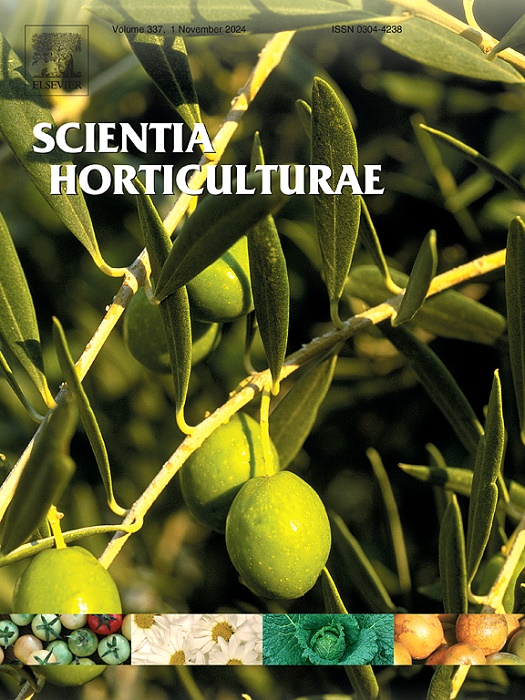The synergy of ACC deaminase producing plant growth-promoting microbes provide drought tolerance in Ocimum basilicum L. cv. “Saumya”
IF 3.9
2区 农林科学
Q1 HORTICULTURE
引用次数: 0
Abstract
The use of plant growth-promoting microorganisms is an effective agricultural practice to improve plant growth, especially under abiotic stress. In this study, the combined impact of three plant growth-promoting bacteria (PGPB) namely Brevibacterium halotolerans (Sd-6), Burkholderia cepacia (Art-7), Bacillus subtilis (Ldr-2) were tested with Trichoderma harzianum (Th) (possessing ACC deaminase producing activity) in Ocimum basilicum L. cv. “Saumya” to reduce drought-induced damages to the plants under different level of drought stress [i.e. well-watered (100 %), moderate (60 %), severe (40 %)]. These PGPB strains, along with Th, were found to be tolerant against osmotic stress when tested in growth media containing different concentrations of polyethylene glycol (PEG 8000), and all were found to endure -0.99 MPa water potential. Compared to non-inoculated control, Th+Ldr-2 treatment improved fresh herb weight (62.45 %) and oil content (61.54 %) and higher photosynthetic rate under severe drought. Besides, in relation to control, the above treatment enhanced nutrient uptake, reduced ABA, ACC as well as ethylene levels and increased IAA content in addition to an increase in important constituents of essential oil, indicating better performance in terms of plant growth under drought. Higher RWC, decreased MDA, and reduced antioxidant activities in Th+Ldr-2 treated plants compared to non-inoculated control under drought support the mechanism of the microbes providing tolerance against drought. Colony forming unit of microbes and scanning electron microscopy (SEM) study support the effective colonisation behaviour of Th+Ldr-2, which protects plants against drought stress. A consortium of diverse microbes, found to improve plant growth under drought through increased nutrient uptake, reducing the levels of ACC and ABA, improving the content of IAA, antioxidant enzymes probably reducing the effect of drought stress and improving plant biomass could be a useful tool to reduce drought-induced losses in crop plants.

产生ACC脱氨酶的植物促生微生物协同作用对罗勒木抗旱性的影响。“环球”
利用促进植物生长的微生物是一种有效的农业措施,以提高植物的生长,特别是在非生物胁迫下。本研究以耐盐短杆菌(Sd-6)、葡萄伯克霍尔德菌(Art-7)、枯草芽孢杆菌(Ldr-2) 3种植物生长促进菌(PGPB)与哈兹木霉(Th)(具有ACC脱氨酶活性)对罗勒木(Ocimum basilicum L. cv)的综合影响进行了试验。“Saumya”可减少不同干旱胁迫水平(即水分充足(100%)、中度(60%)、重度(40%))对植物造成的干旱损害。在含有不同浓度聚乙二醇(PEG 8000)的生长介质中测试,发现这些PGPB菌株和Th菌株都能耐受渗透胁迫,并且都能承受-0.99 MPa的水势。与未接种对照相比,Th+Ldr-2处理提高了鲜重(62.45%)和含油量(61.54%),在严重干旱条件下提高了光合速率。此外,与对照相比,上述处理提高了植株的养分吸收,降低了ABA、ACC和乙烯水平,增加了IAA含量,并增加了重要的精油成分,表明在干旱条件下植株的生长性能更好。干旱条件下,与未接种对照相比,经Th+Ldr-2处理的植株RWC升高,MDA降低,抗氧化活性降低,支持了微生物抗旱机制。微生物菌落形成单元和扫描电镜(SEM)研究支持了Th+Ldr-2的有效定植行为,该定植行为可以保护植物免受干旱胁迫。一个由多种微生物组成的联盟,通过增加养分吸收,降低ACC和ABA的水平,提高IAA和抗氧化酶的含量,在干旱条件下促进植物生长,可能减少干旱胁迫的影响,提高植物生物量,这可能是减少作物干旱损失的有用工具。
本文章由计算机程序翻译,如有差异,请以英文原文为准。
求助全文
约1分钟内获得全文
求助全文
来源期刊

Scientia Horticulturae
农林科学-园艺
CiteScore
8.60
自引率
4.70%
发文量
796
审稿时长
47 days
期刊介绍:
Scientia Horticulturae is an international journal publishing research related to horticultural crops. Articles in the journal deal with open or protected production of vegetables, fruits, edible fungi and ornamentals under temperate, subtropical and tropical conditions. Papers in related areas (biochemistry, micropropagation, soil science, plant breeding, plant physiology, phytopathology, etc.) are considered, if they contain information of direct significance to horticulture. Papers on the technical aspects of horticulture (engineering, crop processing, storage, transport etc.) are accepted for publication only if they relate directly to the living product. In the case of plantation crops, those yielding a product that may be used fresh (e.g. tropical vegetables, citrus, bananas, and other fruits) will be considered, while those papers describing the processing of the product (e.g. rubber, tobacco, and quinine) will not. The scope of the journal includes all horticultural crops but does not include speciality crops such as, medicinal crops or forestry crops, such as bamboo. Basic molecular studies without any direct application in horticulture will not be considered for this journal.
 求助内容:
求助内容: 应助结果提醒方式:
应助结果提醒方式:


